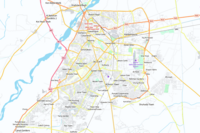
Photo from wikipedia
This thesis asks how opportunities emerge for states in the Global South to undertake large-scale spending on public transport, particularly in cases where they have previously withdrawn from its provision.… Click to show full abstract
This thesis asks how opportunities emerge for states in the Global South to undertake large-scale spending on public transport, particularly in cases where they have previously withdrawn from its provision. In recent years, such opportunities have emerged in the form of mass transit mega-projects, particularly BRT mega-projects. Most of the recent research on BRT adoption predominantly attributes these increasing investments to the changing nature of urbanization and associated increases in demand for public transport, as well as the political will shown by strong, committed local individuals. However, a limited number of scholars have pointed out that demand and political will are not sufficient explanatory variables, and have called for incorporating alternative explanations that pay greater attention to the processes, politics, and the relationships between different agents. This thesis heeds these calls and investigates how these processes and linkages converge to open a 'window of opportunity' that enables change to take place. Using the case of Lahore's first BRT corridor, this study shows that the window of opportunity opened in 2012 as the by-product of an idea under development for roughly two decades in Lahore. Further, it shows that the opportunity for the state to undertake large-scale infrastructure investment in public transport emerged not simply due to individual actors or purely technical reasons, but due to the inter-linkages between a number of agents and broader structural, technological, and historical forces at play. Hence, this thesis argues that it is essential to understand change not simply through individual-centric explanations, but to ground such explanations in the particular political-institutional context in which they are based. This approach can allow us to understand not only how opportunities emerge for states in the Global South to undertake large-scale spending on public transport, but also the reasons why these opportunities arise in the manner that they do. Further, it can allow us to situate the spaces through which more effective, equitable solutions can be imagined.
Journal Title: Antipode
Year Published: 2022
Link to full text (if available)
Share on Social Media: Sign Up to like & get
recommendations!